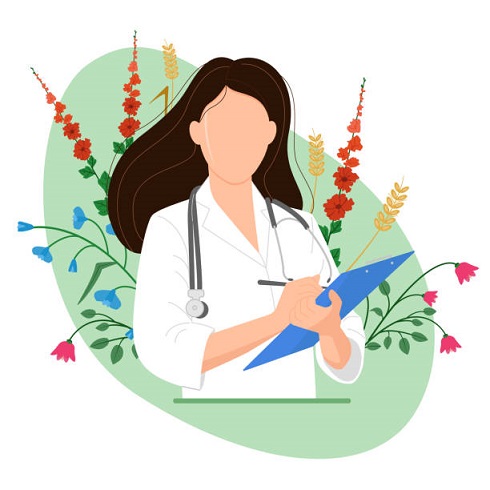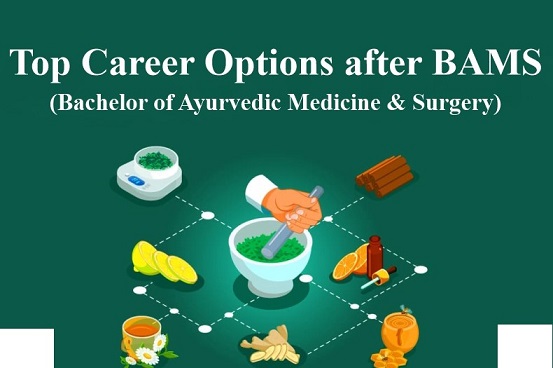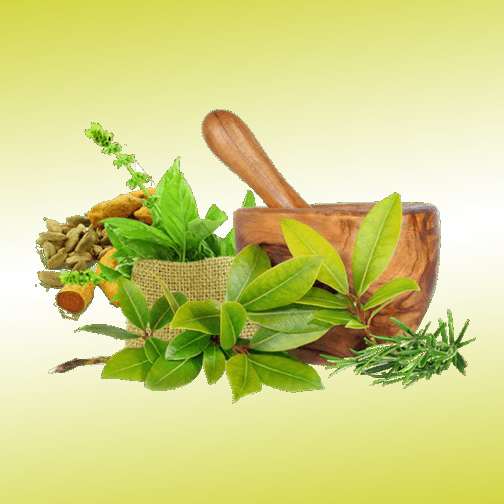Introduction:
B. A. M. S in its entirety is a medical and surgical bachelor of Ayurveda. This is referred to as an undergraduate degree program whose curriculum is designed to teach students both the fundamentals of Ayurveda and how to effectively treat patients. Along with teaching about Ayurveda, this course also covers teachings on contemporary medicine. Combining the knowledge of both in detail is taught to the students who sign up for it as a crucial component of the curriculum.
One of the earliest methods of treating patients with its medicines and determining the true cause of the disease a patient is experiencing is known as Ayurveda. Its primary goal is to treat patients using various herbs and Ayurvedic medications, which are renowned for the natural ingredients they contain.
It can also be viewed as an alternative form of patient care though, this Ayurvedic method of patient care not only assists in curing patients of existing illnesses, but also works to lessen the frequency with which new illnesses enter the body. Additionally, this assists in lowering body heat. At the moment, everyone accepts this alternative form of healing all over the world. Additionally, the WHO (World Health Organisation) has created a global forum to promote these traditional approaches to patient care, one of which is Ayurveda. So, B. A. M. S (Bachelor of Ayurvedic Medicine and Surgery) as a course has given students who successfully complete it a wide range of options.
❖ B.A.M.S Course Highlights-
Let us have a quick highlight about the course of B.A.M.S-
- Level of Degree- Under-graduate
- Duration of the course- 5 years
- Minimum educational requirement- Candidate should pass class 12 exams with Physics, Chemistry, and Biology in Medical Stream.
- Minimum Subject Requirement- Physics, Chemistry, Biology.
- Minimum requirement of Average Score- 50 percent or more than that
- Consistency of Exam- Annual
- Admission or selection process- Based on entrance exams given
- Entrance exams to be cleared- OJEE, KEAM, NEET, and many other entrance exams.
- Course fee- Rs.1 lakh to 3 lakh per year
- The average salary to be expected- Rs 3 Lakhs per annum to Rs 15 lakhs per annum.
- Job title- Ayurvedic Doctor, Category Manager, Business development officer, medical officer, medical representative, Junior clinical trial coordinator.
- Employment areas- Nursing homes, government, and private hospitals, Ayurvedic clinics, Own Business wellness centers.
❖ B.A.M.S (Bachelor of Ayurvedic Medicine and Surgery)- Key advantages of Pursuing it:
Students have a variety of employment options in reputable government hospitals and agencies after completing this course. The pay that can be anticipated is the same as that of a government employee who works as a doctor. When students graduate from BAMS, the Indian government gives them permission to start their own Ayurvedic pharmacy or clinic.
Additionally, candidates can pursue a Ph.D in Ayurveda or fields associated with it, or MD if they so choose. Plus, they have the option of working for prestigious Ayurvedic businesses like Himalayas. Ayurveda offers a wealth of opportunities and choices, but it’s important to remember that understanding its fundamentals will also enable you to apply new knowledge to your daily life and live a healthy life.
❖ Why one should choose to pursue a B.A.M.S (Bachelor of Ayurvedic Medicine and Surgery)?
One of the earliest methods of patient care is Ayurveda, which has been practised for thousands of years. Everyone on earth is aware of its presence. We already know that the World Health Organisation has begun funding efforts to raise awareness of it throughout the world. Because of this, it offers a lot of opportunities to those who are interested in pursuing it to have career options all over the world, including India and abroad, which is typically preferred to be the dream opportunity for most students.

❖ Skills Required to pursue B.A.M.S (Bachelor of Ayurvedic Medicine and Surgery)
B. A. M. S is regarded as one of the suitable career options for those who are interested in the medical field and want to learn more about the various treatment options available. Candidates should possess the following skill-sets in order to advance in the field of Ayurveda.
➢ Should grow a keen interest in the therapeutic qualities of herbs.
➢ The ability to wait should be strong.
➢ Excellent level of concentration.
➢ Should be able to make wise decisions.
➢ A keen eye for detail.
➢ Empathy.
➢ Should be able to provide counselling.
❖ Eligibility Criteria to be fulfilled to pursue B.A.M.S(Bachelor of Ayurvedic Medicine and Surgery)-
➢ To select B. A. M. S. one must complete their class 12th in the science stream with courses in physics, chemistry, and biology if they want to pursue B. A. M. S. as a career.
➢ To be qualified for admission to the B. A. M. S course one should have an average passing percentage of between 50 and 60%. However, some academic institutions have the freedom to choose their own passing percentage scale.
➢ The minimum age for admission to B A. M. S classes at some colleges or universities may also exist.
➢ Students who completely meet the eligibility requirements listed above must take the NEET (National Eligibility Cumulative Interest Test) in order to qualify for it. The results of this exam are taken into account globally, and candidates who place highly on the merit list have a greater chance of being accepted into this program.
❖ Admission process for B.A.M.S (Bachelor of Ayurvedic Medicine and Surgery)-
The entrance exam known as NEET (National Eligibility Cum Interest Test) is regarded as one of the crucial steps in the admissions process for candidates seeking admission to this program. Not only B. A. M. S., candidates must pass this entrance exam in order to enrol in certain medical programs. Students who pass the NEET exam are given the opportunity to participate in focused counselling, during which they are helped to select the best college based on their NEET exam results. Counsellors evaluate candidates based on the personal interview after choosing the college to further assess the applicants.
There is no specialisation option available in the BAMS program. Candidates for this program in Ayurvedic surgery and medicine must decide whether they want to specialise in M.S (Master of Surgery) or M.D (Doctor of Medicine), which are the two options available to them. Students may select from the following options in either of these cases, including-
➢ Sharir Kriya
➢ Rog vikriti vigyan
➢ Padhartha vigyan
➢ Agad Tantra
➢ Rasa shastra
➢ Shailya tantra etc.
Students who have checked the options list while applying may choose from a wide range of additional options.

❖ Course Structure for B.A.M.S-
It takes this course a total of five years, six months to complete. Out of which 4 and a half years are devoted to academic work, with the final year being devoted to an internship. The academic year is broken up into three 1.5 year segments totalling 4.5. And in the years that follow, the subjects that include are taught as:-
◈ For the first year-
- Basic principles of Ayurveda
- History of Ayurveda
- Physiology
- Anatomy
◈ For the second year-
- Toxicology
- Pharmacology
◈ For the third year-
- Principles of surgery
- ENT
- Skin
- Internal medicine
- Modern anatomy etc.
❖ Fee structure of BAMS-
The cost of the BAMS program varies depending on whether a student is admitted to a private or public university and from what jurisdiction does she/he originate. Let’s take a quick look at the fees to get an idea of what they are generally like.
1. For the first year- Rs. 50,000 to 70,000.
2. For the Second year- Rs 1 Lakhs to 2 lakhs.
3. For the third year- Rs 2 lakhs to 6 lakhs.

❖ Scope of BAMS-
In the past, students enrolled in this course had only two options: continue their education or start a clinic. But things are very different right now. Both the public and private sectors offer job opportunities for BAMS graduates. The following list includes some of the sectors candidates can select from.
➢ Education sector
➢ Health sector
➢ Hotel industry
➢ Life science industry
➢ Nursing industry
➢ Pharmaceutical industry
➢ Medical tourism industry.

